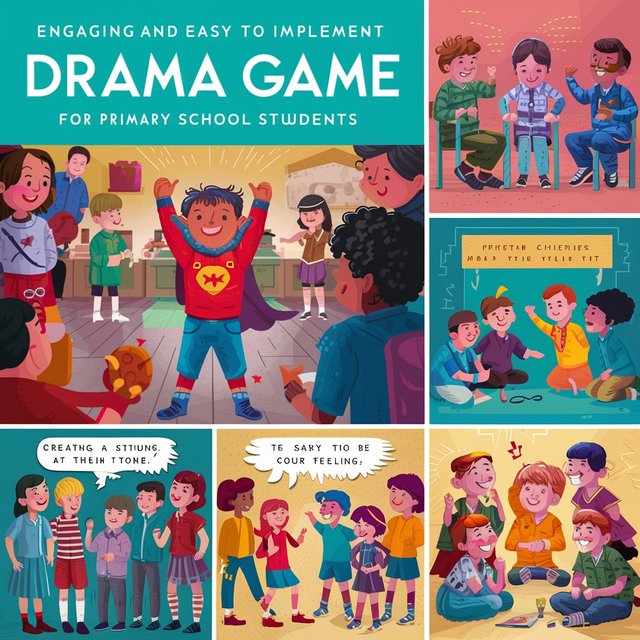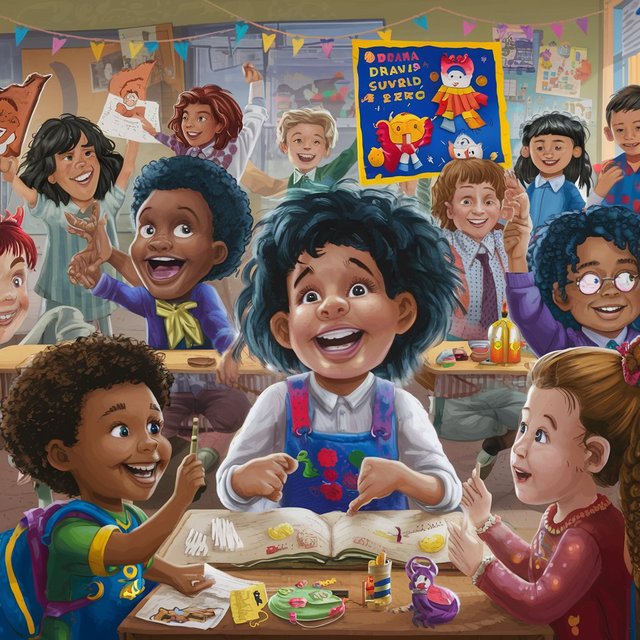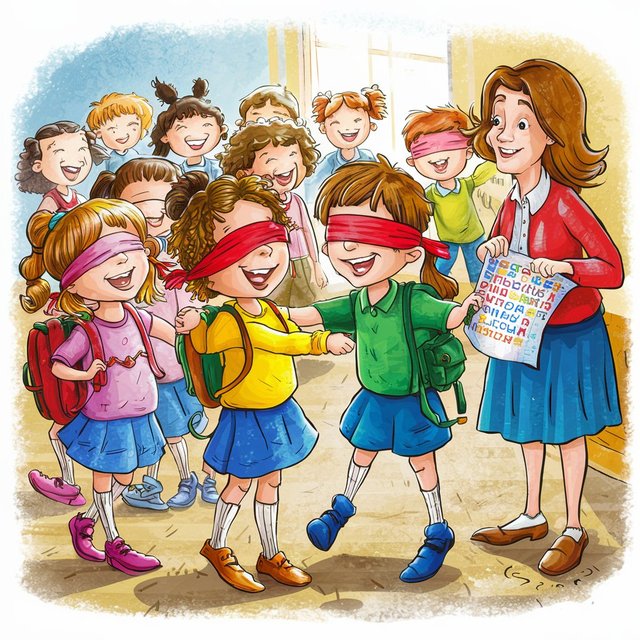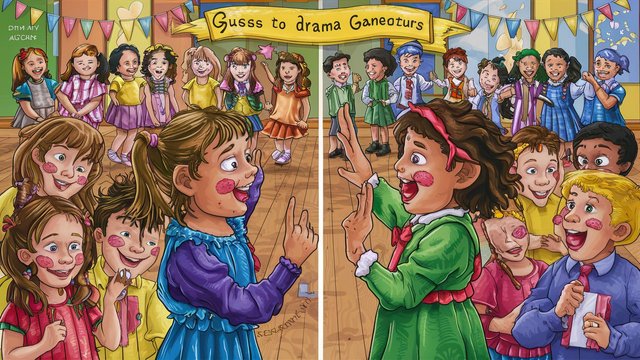Introduction to Drama Games

Importance of Drama Games in Primary Schools
History of Drama Games
Origins of Drama Games
Evolution of Drama Games in Education
Benefits of Drama Games for Primary School Students
Enhancing Communication Skills
Fostering Creativity and Imagination
Building Confidence
Developing Empathy and Emotional Intelligence
Types of Drama Games for Primary School Students
Improvisation Games
Role-Playing Games
Storytelling Games
Movement Games
How to Incorporate Drama Games in Primary School Curriculum
Integrating Drama into Classroom Activities
Organizing Drama Workshops
Utilizing Drama in Language Arts and Social Studies
Examples of Simple Drama Games for Primary School
Freeze Frame
Mirror Game
Sound and Movement
Character Walks
Tips for Successful Implementation of Drama Games
Creating a Safe and Supportive Environment
Allowing for Freedom of Expression
Providing Clear Instructions and Objectives
Overcoming Challenges in Implementing Drama Games
Addressing Shyness and Stage Fright
Dealing with Behavioral Issues
Success Stories and Testimonials
Conclusion
FAQs

How can drama games benefit primary school students?
Are drama games suitable for all age groups?
Can drama games be adapted for online learning?
How do drama games contribute to overall academic performance?
What resources are available for educators interested in incorporating drama games into their curriculum?
Drama Games – Simple Ideas for Primary School
If you have USA then try this: https://cdrdeal.com/
Introduction to Drama Games
Drama games offer an engaging and interactive way for primary school students to explore their creativity, develop essential communication skills, and build confidence. Through various improvisational activities, role-playing exercises, and storytelling adventures, drama games provide a dynamic learning experience that goes beyond traditional classroom instruction.
#WORLDOFXPILAR
Importance of Drama Games in Primary Schools
Incorporating drama games into the curriculum of primary schools holds immense importance. Not only do these activities make learning fun and enjoyable for students, but they also contribute to their holistic development by nurturing social, emotional, and cognitive skills.
History of Drama Games
Origins of Drama Games
The use of drama and theatrical techniques in education dates back to ancient civilizations, where storytelling and role-playing were integral parts of cultural and educational practices. Ancient Greek dramas, for example, were not only entertainment but also served as vehicles for moral and philosophical teachings.

Evolution of Drama Games in Education
Over the centuries, the concept of using drama as a pedagogical tool has evolved significantly. In the 20th century, pioneers such as Viola Spolin and Augusto Boal revolutionized drama education by introducing innovative techniques like improvisation and forum theatre. Today, drama games are widely recognized for their ability to enhance learning outcomes and student engagement.
Benefits of Drama Games for Primary School Students
Enhancing Communication Skills
Drama games encourage students to express themselves verbally and non-verbally, improving their ability to communicate effectively. Through activities like role-playing and improvisation, students learn to articulate their thoughts, listen actively, and collaborate with their peers.
Fostering Creativity and Imagination
Engaging in imaginative play stimulates creativity and encourages students to think outside the box. By exploring different characters, settings, and scenarios, students develop their imagination and problem-solving skills, which are essential for success in all areas of life.
Building Confidence
Participating in drama games provides students with opportunities to step out of their comfort zones and take on new challenges. As they overcome obstacles and succeed in various tasks, students' self-confidence grows, empowering them to tackle future endeavors with courage and resilience.

Developing Empathy and Emotional Intelligence
Drama games require students to put themselves in others' shoes and consider different perspectives. By portraying characters with diverse backgrounds and emotions, students develop empathy and emotional intelligence, which are vital for building positive relationships and navigating social situations.
Types of Drama Games for Primary School Students
Improvisation Games
Improvisation games encourage spontaneity and quick thinking, allowing students to respond creatively to unexpected situations. Games like "Yes, And..." and "One Word Story" foster teamwork and teach students to think on their feet.
Role-Playing Games
Role-playing games enable students to explore different roles and scenarios, helping them understand complex concepts and develop empathy. Games like "Job Interview" and "Historical Figures" provide opportunities for students to step into the shoes of others and see the world from different perspectives.
Storytelling Games
Storytelling games inspire students to unleash their creativity and weave captivating narratives. Games like "Story Cubes" and "Round Robin Storytelling" encourage collaboration and imagination as students take turns adding to a story.
Movement Games
Movement games incorporate physical activity and kinesthetic learning into drama activities. Games like "Statues" and "Animal Charades" encourage students to express themselves through movement and gesture, enhancing their body awareness and spatial intelligence.
How to Incorporate Drama Games in Primary School Curriculum
Integrating Drama into Classroom Activities
Teachers can integrate drama games into various subjects, such as language arts, social studies, and science, to enhance learning outcomes and engage students in hands-on learning experiences.
Organizing Drama Workshops
Organizing drama workshops allows students to delve deeper into theatrical techniques and explore their creative potential under the guidance of experienced facilitators.
Utilizing Drama in Language Arts and Social Studies
Drama can be used to bring literature and historical events to life, making abstract concepts more tangible and relatable for students. By acting out scenes from books or reenacting historical events, students develop a deeper understanding of the subject matter and make meaningful connections.
Examples of Simple Drama Games for Primary School
Freeze Frame
In Freeze Frame, students work in pairs or small groups to create a frozen tableau that depicts a specific scene or emotion. One student initiates the tableau by striking a pose, and the other students join in, adding to the scene until it forms a complete picture.
Mirror Game #WORLDOFXPILAR
The Mirror Game requires students to mimic each other's movements and gestures as if looking into a mirror. This game promotes empathy and teamwork as students synchronize their actions and communicate non-verbally with their partners.
Sound and Movement
In Sound and Movement, students use their bodies and voices to create a dynamic soundscape that reflects a particular setting or mood. By experimenting with different sounds and movements, students explore the relationship between sound, movement, and emotion.

Drama Games – Simple Ideas for Primary School
#WORLDOFXPILAR
Character Walks
Character Walks encourage students to embody different characters by adopting their mannerisms, gestures, and physical traits. Students walk around the room, interacting with each other as their characters, and improvising dialogue based on their personalities and motivations.
Tips for Successful Implementation of Drama Games
Creating a Safe and Supportive Environment #WORLDOFXPILAR